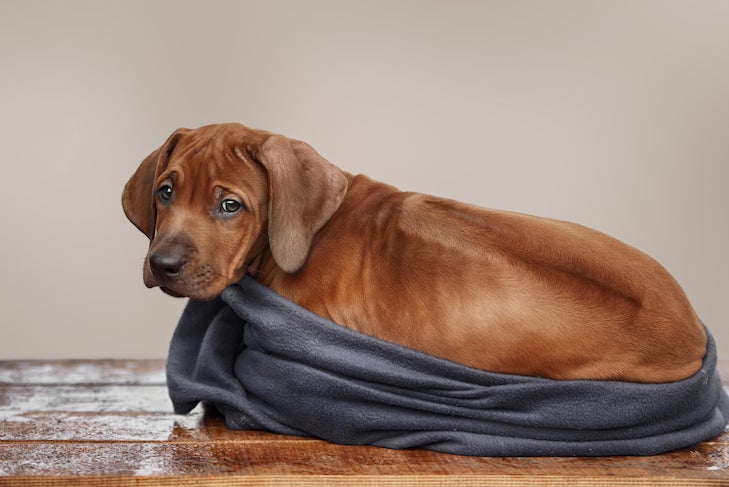
AKC is a participant in affiliate advertising programs designed to provide a means for sites to earn advertising fees by advertising and linking to akc.org. If you purchase a product through this article, we may receive a portion of the sale.
Whenever I get ready to go out, my Portuguese Water Dog runs to our bedroom, grabs his blanket, and carries it downstairs – where he proceeds to quietly knead and suck on it. According to their owners, many dogs do this with their blankets or stuffed toys. But why do dogs suck on blankets?
Sucking Begins in Puppyhood
Puppies are born with an instinct to suckle at their mother’s teats. All things being equal, they are provided with this opportunity and will nurse to their little hearts’ content until, at some later stage of development, the mother, in her wisdom, begins to reject their attempts.
Even when the milk supply has virtually dried up, some pups will try for an occasional comfort suckle if they become uncomfortable. This is an activity that makes puppies feel safe, secure, warm, and comforted.

Animal behaviorists believe that some adult dogs that suck on objects as adults didn’t have the opportunity to do enough comfort suckling as puppies. The mother dog may not have let them continue nursing. She may have been unwell, or the pup may have been separated from the litter very early and fed from a bottle by a human.
Why Do Dogs Suck on Blankets?
We’ve all seen human babies suck on their thumbs, pacifiers, or blankets to help them calm down when they’re upset. This is a habit they usually outgrow by the time they reach toddlerhood.
But puppies who look to blankets for comfort and security don’t usually outgrow the habit. They continue doing it throughout their lives. Blankets are soft and warm, like their mothers.
Some dogs even knead the blankets in an affectionate way. This action moves the blanket into a position the dog likes. After they do this, they’ll lie down on the blanket, though stuffed toys, pillows, or a piece of their owner’s clothing will also do the trick.
Is Blanket Sucking Harmful?
Normal, occasional blanket sucking is not considered to be obsessive-compulsive behavior, also called canine compulsive behavior, because it’s not so all-consuming that it can’t be interrupted. Also, the dog doesn’t do it to the exclusion of other activities for hours on end.
There is a sucking behavior that can be harmful to a dog, and that is called flank sucking. Researchers have found a genetic marker that causes some Doberman Pinschers to perform this behavior. The Doberman Pinscher Club of America says that flank sucking behavior in dogs is almost exclusive to Dobermans. It notes that some dogs will do it to cope or relax, while others will do it obsessively.

“Dogs that don’t suck on their flanks, but instead on blankets, pillows, stuffed animals, and other soft objects are doing it not to be destructive, but as a relaxation mechanism,” says Dr. Jerry Klein, Chief Veterinary Officer for the AKC. “They can be perfectly healthy dogs, who find that the sucking and licking provides comfort by releasing endorphins.”
What Should You Do About Blanket Sucking?
When my Portuguese Water Dog sucks on his blanket, he’s calm and will wag his tail – and he’ll even stop and come when I call him. Yet the blanket seems to give him some comfort when I leave him home alone, and it helps him tone down his energy level at bedtime.
If your dog feels safe and sucks on a blanket or toy to relax, they’re not being destructive to themself or to your possessions. There’s really nothing wrong with what they’re doing.
In order to make sure the behavior doesn’t escalate or indicate an underlying problem, you can:
- Look for triggers, such as thunderstorms, your leaving the house, or visitors.
- Make sure your dog gets plenty of mental and physical exercise.
- Spend quality time with your dog and take them with you when you can.

